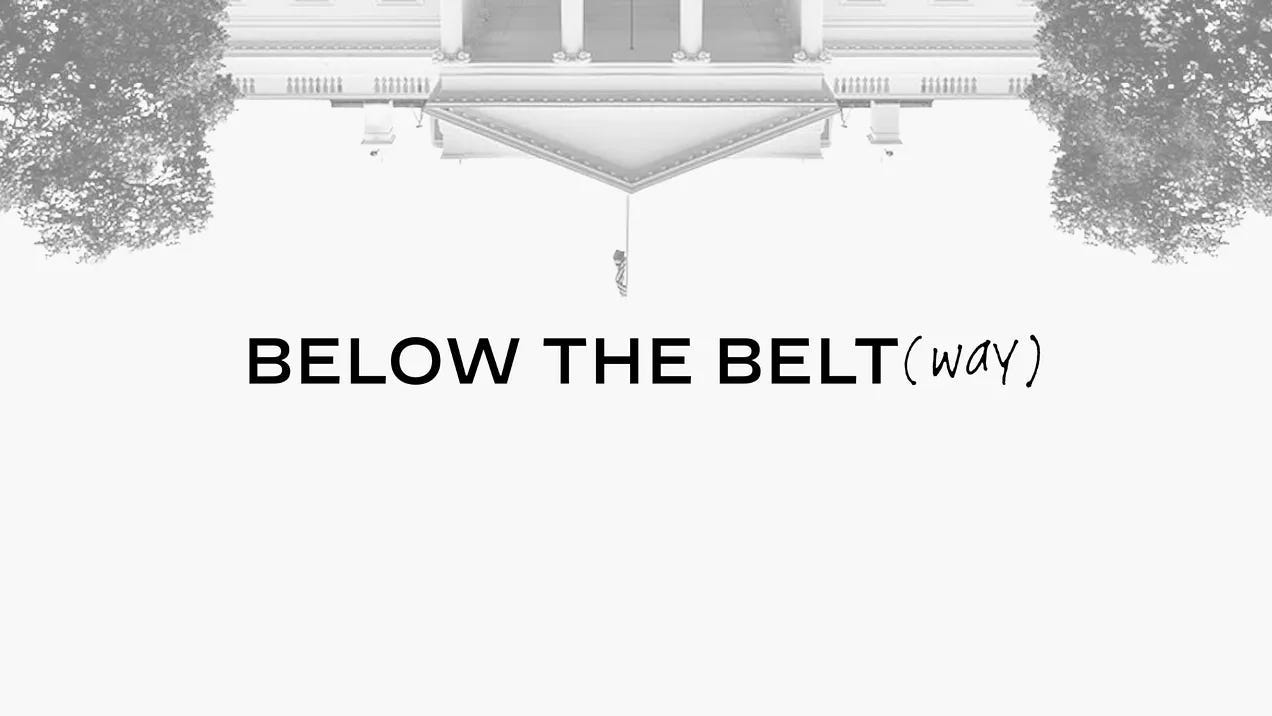DOJ asks judge to allow citizenship checks for certain voters
ALSO INSIDE: State AGs just exposed a backdoor attempt to allow housing discrimination
Cam here 👋 bringing you your daily dose of what people are doing – good, bad, and otherwise – in the world of politics. We’re diving into the stories you won’t see anywhere else. And remember, you can also keep up with me over on TikTok and Bluesky.
And if you’re looking for a little more from COURIER, Akilah Hughes’ darkly comic culture and politics show, “How is this Better?” just featured Roy Wood, Jr., and Ryan Broderick’s got the scoop on Laura Loomer and horse electrolytes in the newest episode of “Panic World.”
Since day one of Trump’s political career, people have desperately attempted to normalize his absurd abuses of power and blatant corruption – and 10 years later, much of corporate media remains a victim of their own attempts to return to a sense of normalcy.
It’s time to stop sane-washing the insanity.
What Happened
The Trump administration last week quietly began its efforts to undo the dozens of nationwide injunctions currently blocking its executive orders from going into effect.
The first target after the US Supreme Court’s ruling to restrict nationwide injunctions is the block on Trump’s executive order to restrict voting access. The motion doesn’t ask for the injunction to be lifted from the entire order, however, only the section requiring documentation of citizenship at the time of voter registration for people on public assistance:
“To enforce the Federal prohibition on foreign nationals voting in Federal elections,” the order states. “The head of each Federal voter registration executive department or agency under the National Voter Registration Act shall assess citizenship prior to providing a Federal voter registration form to enrollees of public assistance programs.”
The narrow scope of the request allows the Trump administration to safely test the waters as it determines the most effective method of successfully challenging the injunctions blocking his executive orders. It also provides cover, as the small request generated little attention from the public.
The decision to start with voter restrictions, coupled with plans to broadly revoke citizenship — first from newborns, then naturalized citizens, and ultimately, loyalty-based citizenship — sets the stage to deny voters en masse access to the ballot box in 2026. In a conversation with US Rep. Valerie Hoyle (D—Oregon), she said the plan is to drastically reduce the number of eligible voters before the 2026 midterms.
“The biggest concern that I have right now is that what is going to happen in the 2026 election and how we preserve our free and fair elections,” said Hoyle. “First, it was immigrants that were criminals. And then it's immigrants that aren't loyal. And then it's those who are here illegally. And now it's citizens that are here that are guaranteed their citizenship through the Fourth Amendment of the Constitution. Stephen Miller even floated taking citizenship away from Native Americans, making them choose their tribal citizenship or United States citizenship.”
If Trump’s challenges to nationwide injunctions are successful, the 30 states that allow the enforcement of his executive orders would feel like a different country than the 20 where they’re blocked: in addition to restricting access to voting, not all newborns would be citizens, medical care could be denied based on sexual orientation, the surveillance state would expand with DOGE and Palantir’s unfettered access to taxpayer’s private data, and federal funds would be withheld from public schools, universities, housing programs, and climate action initiatives at the whim of the president.
Attempts to Sanewash
Why Trump’s birthright citizenship ban still faces an uphill battle in court
How the Supreme Court’s injunction ruling advances Trump’s birthright citizenship fight
Supreme Court sides with Trump on birthright citizenship nationwide injunctions
Far-Right Spin
White House says ‘every’ nationwide injunction to be revisited
CNN Legal Analyst Stuns Host By Explaining Potential ‘Wild’ Scenario Resulting Supreme Court Ruling
States take action on housing discrimination plan
While Trump’s tool of choice for wielding power as president is the executive order, his appointees are able to do a considerable amount on his behalf by merely changing the rules.
Agencies like the US Department of Housing and Urban Development (HUD) put rules in place that dictate how they perform their role in government. Changes to these rules are subject to a period of public comment, but unless these bureaucratic revisions capture the public’s attention, proposed changes often go through with little fanfare.
One recent proposal that might have flown under the radar is to end HUD’s practice of marketing affordable housing developments in an equitable manner. Without this rule in place, developers who receive federal funds to build affordable housing have historically engaged in discriminatory practices, depriving certain segments of the population the opportunity to live in an affordable housing unit.
This proposal, buried in the online Federal Register since June, has now been thrust in the spotlight by attorneys general from 21 states, who told HUD that this proposal would violate the Fair Housing Act.
"Affordable housing is a top concern for Arizonans and it's ridiculous that the Trump administration is considering a rule that would make it harder, and more unfair, to access affordable housing," said Arizona Attorney General Kris Mayes. "It's the opposite of what the President promised to Arizonans."
The rule change is part of HUD’s efforts to follow the Trump administration’s executive orders targeting equitable practices by the federal government. Similar lawsuits have effectively stopped other efforts to enforce these orders, as Trump’s orders claiming to end discrimination tend to invite it instead.
As the dust settles on the undoing of a decade’s worth of diplomatic efforts to prevent war against Iran and Israel, it’s worth looking at who was in the room. This week, let’s take a look at the sort of strategic military minds that have been tapped for Trump’s War Cabinet.
Pam Bondi, United States Attorney General
Since being appointed in February 2025, Bondi has:
A reported net worth ranging from $5 million to $18 million
Shut down FBI task forces relating to foreign influence in elections
Ended enforcement of the Foreign Agents Registration Act
Promised to release Jeffrey Epstein’s client list, then said no such list existed
Declined to investigate Trump administration officials who discussed military strikes in unsecured group chats
Role in ‘Operation Midnight Hammer’
Trump’s backup choice for Attorney General, Pam Bondi, has been a close ally ever since he bribed her not to investigate Trump University when she was Florida’s attorney general. Bondi wasn’t involved in planning the strike, and hasn’t been a presence since it took place, but played a critical role in the administration’s attempt to manipulate the public’s perception of the strike.
While Bondi has no military experience, she does possess some international relations expertise. In 2019, Bondi was required to register as a foreign agent because she had served as a lobbyist for Qatar, one of Iran’s close allies. And that’s her main area of expertise: lobbying the public on behalf of Trump — almost a glorified press secretary — toeing the company line no matter how blatant the lie, and using the power of her office to arrest and intimidate anyone who goes against the administration.
Special Mention: Karoline Leavitt
The actual press secretary was in the Situation Room, too. Karoline Leavitt’s been lying for Trump her entire adult life, and in all reality, was there as more of a fan than an advisor. No military experience, no international relations other than being extremely anti-immigrant.
WATCH: Milwaukee law enforcement to begin using facial recognition
As tensions between the public and law enforcement continue to grow, Reporting for UpNorthNews, COURIER’s Wisconsin newsroom, Henry Teckam uncovered an addition to Milwaukee’s police force that will do little to restore public trust:
“Milwaukee is quietly entering a facial recognition law enforcement deal that could impact millions — with many unaware what’s happening, perhaps to their own data.
Civil rights groups are raising red flags about the risks of handing over sensitive data to private companies, especially when studies show evidence of racial bias baked into the technology.”
Check out Teckam’s story in the video above, and catch UpNorthNews’ daily broadcast, “Mornings with Pat Kreitlow,” for regular updates on the Badger State.
Advertise in this newsletter
Do you or your company want to support COURIER’s mission and showcase your products or services to an aligned audience of 190,000+ subscribers at the same time? Contact advertising@couriernewsroom.com for more information.









There is SO much to be alarmed about in this post! This should be read by everyone. The reality that people could be denied voting because they receive public assistance is beyond terrifying. If they can do that and deny people they deem unworthy of being offered affordable housing, we are in much bigger trouble than I realized. Millions of people may be denied the right to vote next year, and getting this information out will prove daunting. With people on assistance often working multiple jobs to make ends meet, they don’t often read newspapers or watch the news, instead getting all of their information from social media, which is hardly a good source of information. We have to push this information, get it out as far and wide as possible. Take to social media and post this in hopes of reaching as many people as possible. Thank you for the heads up!!